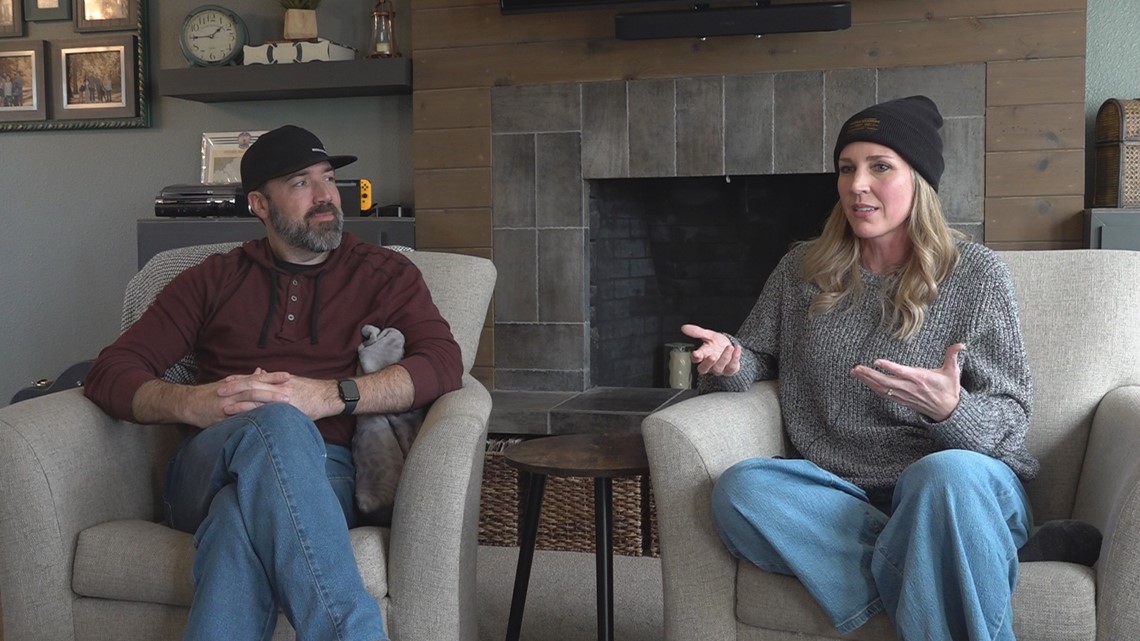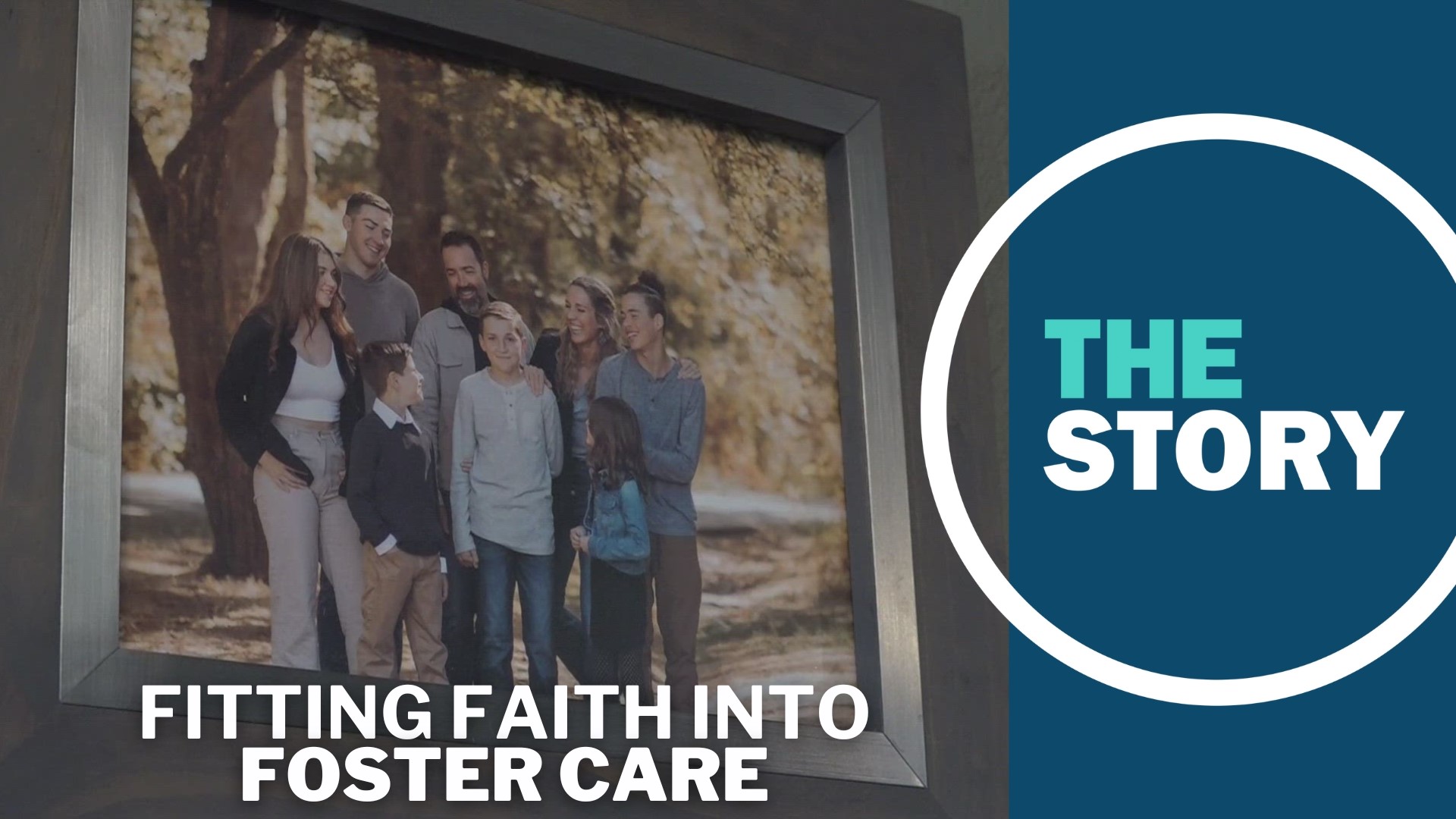BEAVERTON, Ore. — A federal lawsuit in Oregon threatens to pit the state's foster care policies for protecting LGBTQ+ youth against the religious freedoms of potential foster parents. But some families in Oregon say that the two don't need to be in conflict.
Though Jeremy and Kristina Thom occupy a little house in Beaverton, they have a big family.
"We have six kids — three biological and three that we've adopted out of foster care," Jeremy Thom said. The children range in age from 9 to 20.
The Thoms have been married for about 21 years, although they both have to think about it a bit before pinning it down. Jeremy is a pastor at Hope City Church in Milwaukie, and Kristina sings on the worship team.
About a decade ago, the couple felt an urge to do more. That started them down a road toward caring for other kids by becoming foster parents — although they each say that they heard different calls to action.
"I saw a news article, and it was about this tragic story — there were five siblings and they had lost both parents in a car accident," Kristina recalled. "So, I contacted the email that was given for their caseworker and said, 'We'll take them.'"
As it turned out, it wasn't that simple — becoming a foster parent in Oregon takes more than just a whim and a phone call. But as she reflected on the bond she shared with her own four siblings, Kristina didn't give up on the idea.
For Jeremy, the journey was a spiritual one, but it took him beyond the walls of his church.
"Even working in the church, I found myself kind of frustrated ... not that the church was bad or there was anything wrong, there were just certain things that we weren't involved in in the community that I thought were really important," he explained.
The Thoms had three young biological children at the time. They approached becoming a foster family as a team effort.
"We wanted to invite them in on this journey with us, and that's kind of how we even presented it to them," Kristina said.


Faith was a powerful motivator for the Thoms in their journey toward becoming a foster family, but they are far from alone. According to an analysis by the Movement Advancement Project, about 40% of child placement agencies have some religious affiliation, most of them Christian.
Research from the University of Tennessee suggests that Christians are three times more likely to consider fostering than others and twice as likely to adopt. Families also reported that support from their church was one of the top factors in being a successful foster parent.
But when it comes to sharing that faith with kids who are considered custody of the state, each state has specific guidance. In Oregon, parents are required to support kids in ways that may conflict with their religious beliefs.
Bates v. Pakseresht
Last year, a single mother of five biological kids in Malheur County sued the state of Oregon in federal court. When she tried to become certified as a foster parent, Jessica Bates — who is a Christian — said she could not support LGBTQ+ children in all the ways the Oregon Department of Human Services requires they be supported.
When it comes to providing gender-affirming medical care, for example, Bates wrote to DHS, "I cannot support this behavior in a child. I believe God gives us our gender/sex, and it's not something we get to choose."
In November, a judge denied Bates' request to suspend the DHS rule requiring that foster parents support LGBTQ+ kids, writing that foster parents are not empowered to impose their own religious beliefs on children who are in the custody of the state, but required to accept and support a child's rights.
Bates has appealed the decision, and her case is ongoing.
Meanwhile, a version of Oregon's requirement could go national. The U.S. Department of Health and Human Services has proposed a rule change that would require anyone who wants to be a foster parent to support LGBTQ+ kids in their care, streamlining requirements that differ widely between states.
Conservative attorneys general from 19 states sent a letter opposing the rule change — in part, they say, because of the effect it would have on religious parents.
"The foster care system depends on individuals and organizations of faith," the state AGs wrote. "Without faith-based organizations and foster homes, the foster care system would face a critical lack of placement options."
There is a very real crisis for foster care in the U.S. There were nearly 400,000 kids in the foster care system across the country as of 2021. In Oregon, there are more than 5,600 kids in the system.
The kids come first
Like Bates, Jeremy and Kristina Thom are Christians. But for them, Oregon's requirements for foster parents have not been an issue.
"We just felt the urgency of children needing a family, people to just come around them and love them right where they are," Kristina said, "and the rest of the stuff we would just need to deal with it as it comes."
The Thoms said that the kids and their needs come first, whatever those might be.
"The reality is, with all kids — foster kids, adopted kids, biological kids — they're their own people," Jeremy said. "Do I want to be that kind of person that's going to walk by and judge that, or do I want to just go and sit at the table and learn from Jesus and love like Jesus, who is at a table with people that he's not asking to be anything different than they are at the moment? He's literally just meeting them where they are with his love."
They personally may hold more traditional Christian views of sexuality and gender, but they also think that these issues are more nuanced than some Christians are willing to admit — and regardless, their principles come second to their relationships with the children they welcome into their home.
"I don't think I need to speak a lot of words; I don't think I have to pound Bible verses over and over into everyone that walks into my home," said Kristina.
"For us, it hasn't been so much about sharing our faith verbally with the kids who come into the house as much as it is about just seeing love in action," added Jeremy.

